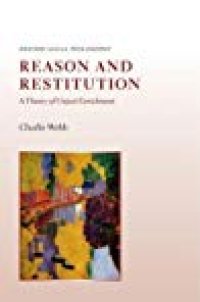
Ebook: Reason and Restitution: A Theory of Unjust Enrichment
Author: Charlie Webb
- Series: Oxford Legal Philosophy
- Year: 2016
- Publisher: Oxford University Press
- Edition: Hardcover
- Language: English
- pdf
In law, gains, like losses, don't always lie where they fall. That there exists a body of law dealing with liability for gains is now settled and the circumstances in which the law requires defendants to give up their gains are well documented in the work of unjust enrichment lawyers. The same cannot be said, however, of the reasons for ordering restitution of such gains.
It is often suggested that unjust enrichment's existence can be demonstrated without inquiry into these reasons, into the principles of justice it represents and invokes. Yet while we can indeed show that there exists a body of claims dealing with the recovery of mistaken payments and the like without going on to inquire into their rationale, the same cannot be said for unjust enrichment's existence as a distinct ground of such claims. For if unjust enrichment exists as a body of like cases and claims, truly independent of contract and tort, then it does so by virtue of the distinct reasons it identifies and to which these claims respond.
Reason and Restitution offers an analysis of the reasons which support and shape claims in unjust enrichment and how these reasons bear on the law's application and development. The identity of these reasons matters since it establishes how, and to what extent, unjust enrichment really is independent of contract and tort, giving us a clearer understanding of unjust enrichment's relationship to these and other concepts and categories. But, more importantly, it matters to those charged with the practical tasks of deciding cases and making laws, for it is these reasons alone which can direct how judges and legislators ought respond to these claims.
It is often suggested that unjust enrichment's existence can be demonstrated without inquiry into these reasons, into the principles of justice it represents and invokes. Yet while we can indeed show that there exists a body of claims dealing with the recovery of mistaken payments and the like without going on to inquire into their rationale, the same cannot be said for unjust enrichment's existence as a distinct ground of such claims. For if unjust enrichment exists as a body of like cases and claims, truly independent of contract and tort, then it does so by virtue of the distinct reasons it identifies and to which these claims respond.
Reason and Restitution offers an analysis of the reasons which support and shape claims in unjust enrichment and how these reasons bear on the law's application and development. The identity of these reasons matters since it establishes how, and to what extent, unjust enrichment really is independent of contract and tort, giving us a clearer understanding of unjust enrichment's relationship to these and other concepts and categories. But, more importantly, it matters to those charged with the practical tasks of deciding cases and making laws, for it is these reasons alone which can direct how judges and legislators ought respond to these claims.
Download the book Reason and Restitution: A Theory of Unjust Enrichment for free or read online
Continue reading on any device:

Last viewed books
Related books
{related-news}
Comments (0)